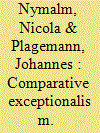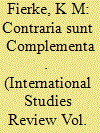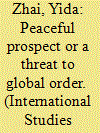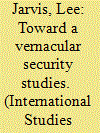|
|
|
Sort Order |
|
|
|
Items / Page
|
|
|
|
|
|
|
| Srl | Item |
| 1 |
ID:
164450


|
|
|
|
|
| Summary/Abstract |
Existing research on exceptionalism in foreign policy suggests a number of confrontational features making it a threat to peaceful international relations. Largely based on US and European cases, and hardly ever taking a comparative approach, this literature overlooks a variety of exceptionalisms in non-Western countries, including so called “rising powers” such as China and India. A comparison between exceptionalist foreign policy discourses of the United States, China, India, and Turkey shows that exceptionalism is neither exclusive to the United States, nor a “new” phenomenon within rising powers, nor necessarily confrontational, unilateralist, or exemptionalist. As a prerequisite for comparative work, we establish two features common to all exceptionalist foreign policy discourses. In essence, such discourses are informed by supposedly universal values derived from a particular civilization heritage or political history. In order to systematize different versions of exceptionalism, we then propose four ideal types, each of which reflects exceptionalism's common trait of a claim to moral superiority and uniqueness but diverges across other important dimensions, with implications for its potentially offensive character. The article concludes by formulating a research agenda for future comparative work on exceptionalist foreign policy discourses and their repercussions for great power relations and global politics.
|
|
|
|
|
|
|
|
|
|
|
|
|
|
|
|
| 2 |
ID:
164456


|
|
|
|
|
| Summary/Abstract |
The physicist Niels Bohr identified a parallel between quantum physics and Daoism and Buddhism. This parallel maps onto two debates regarding global IR, on the one hand, and the implications of quantum physics for the social sciences, on the other, highlighting the potential for a conversation between them. The quantum arguments unsettle the hierarchy between “positivists” and “reflectivists,” raising a question of which science, while Daoism and Buddhism, as traditions that have for millennia explored questions of language, agency and ethics, provide a framework for beginning to think about the human and social implications of more recent discoveries in quantum physics. Starting with Bohr's concept of complementarity, the argument moves to an analysis of Karen Barad and Alexander Wendt's work on quantum physics and the social sciences and then explores Bohr's parallel to Daoism and Buddhism. The structuring of the article around a series of oppositions, including particle/wave, ontology/epistemology, materiality/consciousness, egoism/relationality, and East/West highlights the relationship between global entanglement and the constitution of difference with it.
|
|
|
|
|
|
|
|
|
|
|
|
|
|
|
|
| 3 |
ID:
164455


|
|
|
|
|
| Summary/Abstract |
By championing certain actors over others, International Relations (IR) theory conventionally avoids questions of agency and does not, at least in theoretical terms, discuss which entities can develop capacities needed to act in world politics. Whether it is states, institutions, or individuals, we simply “locate” agency in particular entities, which then exist and act as global governors qua definition. In other words, agency is determined by a priori claims and we rarely reflect the dispositions needed to be(come) an actor in the first place. Even global governance, despite its impetus to consider agency beyond the state, has not engaged in such a discussion, at least not in theoretical terms. In order to initiate such a discussion, the paper draws on the distinction between substantialism and relationalism. After reviewing how agency has been framed in IR, the paper outlines three general dispositions of agency and relates those to the two ontological perspectives. Based on this theorization, the paper contents that IR's lack of reflection and its substantialized notions of agency, whether in rationalist or constructivist appearance, remain problematic. As such, there is potential to conceptualize agency in world politics not as an inherent disposition of entities but rather as emerging from social relations between them. Such a framework compels researchers to not just assume discrete actors but to focus on relational processes through which their agency emerges in the first place and sustains over time. Reconstructing these processes reveals their political nature and allows us to consider who should govern the world.
|
|
|
|
|
|
|
|
|
|
|
|
|
|
|
|
| 4 |
ID:
164449


|
|
|
|
|
| Summary/Abstract |
Recent studies of media and security continue to be limited by various theoretical and ontological commitments, despite their claims of “moving beyond” or “reconsidering” the CNN effect. In this article, I review the two dominant research paradigms for media and security. The first research paradigm, which includes the CNN-effect literature, imagines media as an independent actor in the policy-making process. The second research paradigm portrays media as a neutral channel, passing along the message of foreign policy elites. Each of these paradigms remains wedded to an actor-centered and choice-theoretic approach to media and security, as witnessed by recent attempts to study the CNN effect. I argue that a new research paradigm based on relational sociology actually moves media and security studies beyond the CNN effect and resolves the fundamental theoretical limitations associated with it.
|
|
|
|
|
|
|
|
|
|
|
|
|
|
|
|
| 5 |
ID:
164451


|
|
|
|
|
| Summary/Abstract |
This article investigates youth perceptions of China's rise in seven Asian societies. Unlike previous studies’ findings that most Asians hold positive views of China's influence, this study finds that Asian youth view a rising China more coolly than does the general public. Even though they acknowledge that China's rise offers increased opportunities, Asian youth tend to strongly distrust and worry about the negative influence of China. The results show that most youth in Asian countries surveyed believe China's rise will challenge global order and that China will not maintain peaceful relations with other Asian countries. Multilevel analyses show that both microlevel personal traits and macrolevel structural factors can account for how Asian youth view China's rise. The results indicate that China has not successfully convinced young Asian citizens of its determination to rise peacefully. China's foreign policymaking should take greater consideration of Asian public opinion rather than be dominated by wishful thinking.
|
|
|
|
|
|
|
|
|
|
|
|
|
|
|
|
| 6 |
ID:
164453


|
|
|
|
|
| Summary/Abstract |
Discourse analysis offers an extremely diversified landscape, spanning time and disciplines far beyond the field of international relations (IR). With a rich lineage, it comes as no surprise that under the label “Discourse Analysis” (DA) one cannot find a unified theoretical family within IR but rather a plurality of heterogeneous ways of approaching discourse analysis. By leveraging the wealth of discourse analytical works accumulated over more than three decades, this article intends to discuss some of the main theoretical tenets of three competing perspectives on discourse analysis (PDAs): constructivism, critical realism and poststructuralism. It does so by tracing their links to their respective putative philosophical referents. Distinct from Milliken (1999), who consciously stresses the commonalities between various PDAs, this contribution identifies the differences between them. The paper proceeds as follows. First, it locates IR PDAs in the framework of debates over the core branches of the philosophy of social science. Constructivist, poststructuralist and critical realist PDAs will be located along both a foundational/nonfoundational ontological continuum and a positivist/post-positivist epistemological continuum. Secondly, it retraces the main tenets of post-structuralist, constructivist, and critical realist PDAs to discourse by identifying the relevant debates that have characterized the approach to discourse analysis in IR. Finally, it presents some methodological guidelines and provides examples on how DA endeavors have been practiced.
|
|
|
|
|
|
|
|
|
|
|
|
|
|
|
|
| 7 |
ID:
164452


|
|
|
|
|
| Summary/Abstract |
Economic sanctions have faced substantial criticism for being blunt coercive instruments that inflict a broad array of harms upon innocent populations. In response to this, the targeted sanctions movement has sought to limit the form, function, and scope of sanctioning efforts to minimize their adverse effects on average citizens who have no direct role in influencing the objectionable policies sanctions' senders senders want changed. We seek to take stock of whether targeted sanctions are truly more ethical coercive policies. We argue that targeted sanctions strategies, as practiced by the international community, tend to make tradeoffs amongst just war theory principles and at the cost of sanctions’ utility. Rather than representing an ethical form of coercion, targeted sanctions often just differ from more comprehensive sanctions in how they violate just war principles. We demonstrate this by showing that although targeted sanctions are arguably more consistent with the principle of discrimination's prohibition of deliberately targeting civilians, they nevertheless conflict with other norms, such as proportionality and reasonable probability of success. Moreover, targeted sanctions have these adverse effects despite an appearance of precision that may make it easier to employ coercion.
|
|
|
|
|
|
|
|
|
|
|
|
|
|
|
|
| 8 |
ID:
164454


|
|
|
|
|
| Summary/Abstract |
This article seeks to situate, evaluate, and advance the recent “turn” toward the “vernacular” within security studies. It argues that vernacular security studies has significant advantages over alternative “bottom up” approaches. First, its conceptual emptiness allows for genuinely inductive research into public experiences, understandings, anxieties, and fears. Second, it offers engagement with a potentially far richer tapestry of everyday (in)securities by refusing to prioritize particular populations by virtue of their identity or sociopolitical position. And, third, such an approach avoids the universalism inherent within related, yet more explicitly cosmopolitan, approaches to security. The article begins by situating vernacular security studies within relevant intellectual and (geo-)political dynamics from the late twentieth century. A second section distinguishes this approach from six alternative traditions with a similar emphasis on individual human referents: human security, critical security studies, postcolonialism, feminism, ontological security studies, and everyday security studies. The article then elaborates on the significance and added value of vernacular approaches to security, before outlining core conceptual, methodological, and ethical questions for future research.
|
|
|
|
|
|
|
|
|
|
|
|
|
|
|
|
|
|
|
|
|